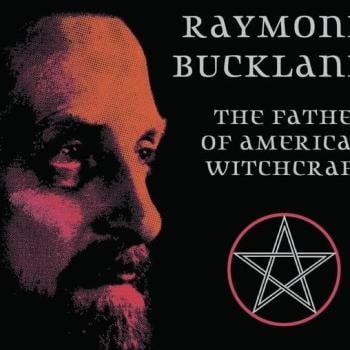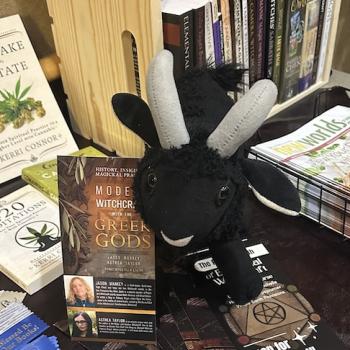For many Witches Halloween/Samhain season is the most joyous time of the year. We gather together to celebrate Samhain, or perhaps visit a Halloween party or watch our children trick or treat. There’s always a heady mix of the mundane and the miraculous every October and I always look forward to celebrating it. Late Autumn is just so Witchy and Pagan that it’s hard not to get caught up in it.
But there’s a downside to Hallowtide, and it’s generally all the stupid articles online about Witches and Halloween. Just for fun today I went to Google News and did some news searches for Pagan, Witch, and Witchcraft and got back some maddening results. Reading buffoonish things in the NY Post or the website Charisma News didn’t surprise me all that much, but the level of stupid was just so off the charts that I thought it might be fun to share it with you all.
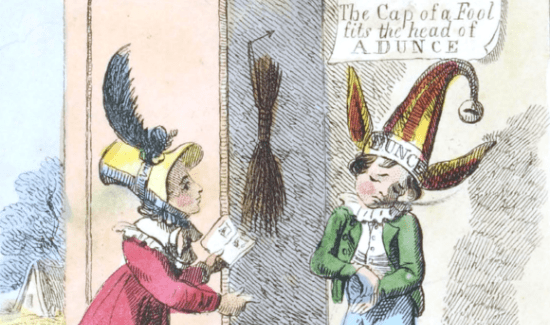
Let’s start with the NY Post, a paper so prestigious that the Columbia Journalism Review once said of it: “”the New York Post is no longer merely a journalistic problem. It is a social problem – a force for evil.” That a Rupert Murdoch owned paper would write something stupid about Wicca in October is to be expected, but it’s the level of stupid that’s the problem. Instead of talking to sane Witches, columnist Andrea Peyser decided to go straight to someone looking to profit from Witchcraft: Christian author and (self-professed) former Witch Selah Ally Tower. Here’s an excerpt:
“Casting spells, I saw results. Usually, it was like — maybe I needed money or I needed a car. I needed love in my life. It was very selfish. It was all about what I wanted. I was really satisfied with my life.’’ So why give it up?
Could it have something to do with Satan?
Witchcraft is practiced by a growing number of lapsed Christians seeking easy gratification for life’s most pressing needs: sex, hot clothes, relief from rotten marriages.
The Christian Post reported in 2013 that multiple conservative scholars have concluded that there were more than 200,000 people who have declared themselves witches in the United States, and as many as 8 million undeclared practitioners of “the craft.” This makes sorcery the second-fastest-growing religion in the US, after Islam.
And the number of witches reportedly doubles every 30 months.
If the number of Witches doubles every 30 months why doesn’t my readership? And I don’t think I’ve never met a Witch who does spellwork for “hot clothes.” Witchcraft isn’t for “easy gratification” either, it’s generally pretty hard work.
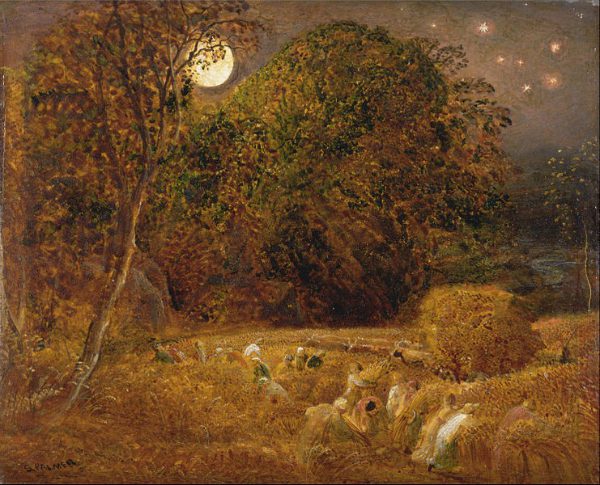
If you’ve seen the name Selah Tower before it’s probably because she’s been featured in a few Pagan blogs over the years. You see Tower writes about her (bullshit) experiences in Witchcraft for a Christian audience that doesn’t know any better. She’s written two whole books, two! She’s like the second coming of Sybil Leek, but with lies!
Tower appears in a lot of newspapers this time of year, either because journalists are lazy or they have a theological axe to grind, and she’s not limited to the United States either. The UK’s Daily Mail basically quoted the above New York Post story but included these lovely bullet points:
*Selah Ally Tower, 58, from New Jersey, joined a coven after studying witchcraft in 1989
*She said she didn’t believe the devil existed at the time and explained that she thought she was ‘worshiping the goddess’ as a Wiccan
*The former witch said coven members were encouraged to divorce, so they could have relationships with other Wiccans
*Ally, who goes by her middle name, said she would cast spells to make her richer and stronger as a part of the Wicca religion
*She returned to Christianity in 2000 and is now happier than ever
*As Halloween approaches, she advises that people ‘be careful in their choice of costume’
I have never, ever, ever, ran into anyone in the Craft who encourages people to get divorced. Half of my friends are married to spouses who aren’t involved in the Craft and it’s never been a problem. And what does “be careful in their choice of costume” mean? I wear Flash underroos on a regular basis and it hasn’t turned me into a superhero. Dressing up as a ghost or a Witch is not going to turn a kid into a ghost or a Witch. All this ridiculousness wouldn’t be such a big deal if these articles weren’t shared thousands of times. The one quoted directly above has over 3.5 thousand shares, more than this article will get. Moving on . . .

Charisma News is the online “news” arm of Charisma magazine, a Christian periodical mainly aimed at Pentecostals and Evangelicals. Yes, this is going to be horrible, but they seem to have a big reach, at least according to my Google News feed. Curious if you are under “witchcraft attack” or not? Writer Jennifer LeClaire is here to help!
In my experience, though, there are some practical questions you can ask yourself to help you discern a witchcraft attack:
1. Are you on an emotional roller coaster, rushing from anger to sadness to confusion? You could be under a witchcraft attack.
2. Are you so overwhelmed with your circumstances that you just want to call in sick, stay in bed and feel sorry for yourself? You could be under a witchcraft attack.
3. Do you feel like nobody can possibly understand what you are going through and that nobody even cares anyway? You could be under a witchcraft attack.
4. Do you feel like everything you do is wrong, that nobody appreciates you anyway? You could be under a witchcraft attack.
5. Are you getting offended with people, are you touchy and fretting over what people are doing or saying? You could be under a witchcraft attack.
6. Are people rising up against you with false accusations and angry outbursts without any apparent justification? You could be under a witchcraft attack.
7. Are you reasoning out your life to the point of fear or confusion? You could be under a witchcraft attack.
Reading her questions it seems as if we are all under “witchcraft attack,” or it could be that some of us are sick, delusional, or just plain depressed (a serious medical issue). I’m thinking that instead of blaming witchcraft Jennifer’s readers might want to see a mental health professional.
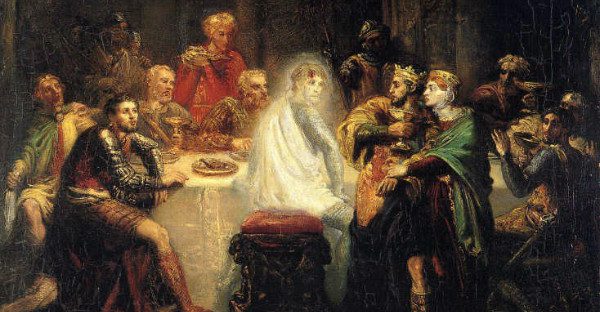
You want a good scare this Halloween? Nearly 300,000 people have shared the article Why Christians Absolutely Should Not Celebrate Halloween. There’s no wiggle room here, Halloween is absolutely off limits. Here’s a few gems from this article:
As I grew closer to the Lord and gained more knowledge of His Word, I began to feel convicted about Halloween. I had thoughts like:
*God is a God of life, but Halloween focuses on death. Should I celebrate a holiday where people decorate their front yards with tombstones?
*Witchcraft is clearly detestable to the Lord (Deut 18:10-13). Shouldn’t something that glorifies witchcraft (just take a walk through the Halloween store) be detestable to me as well?”
*Halloween is a sacred, high holiday for Wiccans (the official religion of witchcraft). Is this a holiday Christians should celebrate alongside Wiccans?
*Is it cute when we dress our kids like the devil (or witches, ghouls, scary characters, etc.)? Isn’t it, well, demonic?
*What if my child dresses in a wholesome fireman costume? Romans 16:19 says that we need to be wise to what is good and innocent of evil. If I let him participate in Halloween, even while dressed as a fireman, aren’t I sending him a mixed message by allowing him to participate in a celebration of evil?
Halloween is not witchcraft Pastor Over-Reaction, it’s fun! And why are we the ones obsessed with death? There’s no execution device around my neck or sitting on my altar, I bet there’s one on yours (it’s called a cross). Christianity is all about death and what lies beyond. The whole point of this article is “be scared because our loving God is going to punish you in the afterlife.” Why does that make my religious practice the weird one?
Pastor Jamie Morgan also has a plan to make you the most popular person on the block if you worship Jesus like she does:
Setting aside a day to celebrate evil, darkness, witchcraft, fear, death and the demonic brings disdain to God. Period. A Christian celebrating Halloween would be like a Satan worshiper putting up a nativity scene at Christmas while singing, “Happy Birthday, Jesus!” The two just don’t go together. Jesus has nothing in common with Satan (2 Cor. 6:14), and neither should we.
So, what did we do instead? Hide in the basement with the lights off? Hustle the family out of the house? No, darkened homes are the enemy’s victory! Where does your light shine the brightest … in the darkness!
Halloween is the one day a year when neighbors come to your door expecting to receive something. So give them JESUS! Our family chose to give God the glory and the devil a black eye by reaching out to our neighbors with the gospel of Jesus Christ! “You are the light of the world … let your light shine among men that they may see your good deeds and glorify your Father in heaven.”
I put a nativity scene up at my house and according to Pastor Jamie I worship the Devil so let’s throw her first argument out the window. And seriously, if you want your neighbors to hate you and your kids to be made fun of, then by all needs pass out mini-Bibles and other forms of Christian propaganda this Halloween. Everyone will love you for it. Meanwhile my Witchy wife and I will be dressed up in some fun costumes passing out good candy to everyone who knocks on our door. (No spiritual advice will be given to the trick or treaters either.) If dressing up in a Wonder Woman costume brings kids closer to Satan, well I’m thinking none of us should ever go outside again.
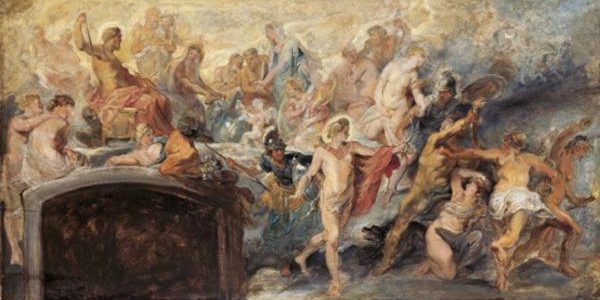
Perhaps the most ludicrous Pagan related article floating around social media the last few days has been Could Paganism Make a Comeback? by columnist Pascal-Emmanuel Gobry writing for The Week. Gobry makes several wild accusations about paganism (both ancient and modern) while seemingly knowing nothing about either form of it. I get the feeling that he believes the current Pagan Revival is only taking place in Iceland.
Gobry writes that paganism was amoral:
Some modern historians sometimes praise the supposed “tolerance” of paganism, which (see below) was ludicrous. A more accurate description is that paganism was amoral. Paganism, as such, had no explicit moral teachings. It certainly had no teachings against slavery, including sexual slavery, or against adultery, oppression, poverty, or anything else, for that matter. This is not to say that paganism was immoral, or that pagans were more immoral than any other sort of person. It was just that people saw religion and morality as two completely different things.
The problem here is that Gobry suffers under the delusion that there was just one kind of ancient paganism. In reality there many (perhaps hundreds or even thousands) of ancient paganisms. Some of those paganisms were concerned with “moral teachings” and some were not. If one looks at the many strains of Christianity floating around the United States today they’ll notice nearly the same thing. And ancient Roman pagans were generally pretty tolerant, as long as you paid your taxes, made your sacrifices to the Emperor, and didn’t stir up trouble they’d mostly leave you alone.
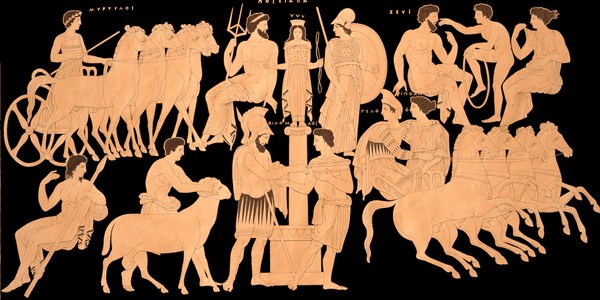
Perhaps the dumbest part of Gobry’s argument involves a discussion of paganism and “scapegoating.” See if you can spot the 200 things wrong with these paragraphs:
This was the meaning of scapegoating. Every pagan myth relies on scapegoating — one person has committed a sacrilege, this causes disorder, and order is only reestablished when the scapegoat is killed. Oedipus, King of Thebes, has killed his father and slept with his mother. A plague descends thus on Thebes, but once Oedipus plucks his eyes out and leaves, the plague abates. Of course, in real life, the scapegoat is almost never the actual cause of the disturbance. But to recognize this would threaten the social order, and this is what paganism cannot abide. Indeed, in ancient Rome, executed criminals were sometimes understood as human sacrifices to the gods.
The French scholar René Girard pointed out how the non-pagan myth, the Bible, stood this logic of scapegoating on its end. While the myth of Oedipus tells us that Oedipus was guilty and this is why his punishment was just, the Biblical story of Joseph has Joseph being wrongly accused of another sexual crime — trying to rape pharaoh’s wife — and good things happening to the nation only when Joseph is recognized as innocent and vindicated. This anti-scapegoating narrative, of course, reaches its apex in the figure of Jesus, who is scapegoated by every legitimate authority, political and religious, yet vindicated by God through his Resurrection.
I would argue that the entire Old Testament revolves around Yahweh being mad at “his people” and then killing a lot of them. Bad things happen to the Israelites when they do something their god disagrees with, and it only stops when they repent (or everything is destroyed). Christianity is a religion of scapegoating, everything is the fault of “the Devil” or other such nonsense. I’m just not sure what Bible Gobry is reading.
And ancient pagan mythology covers a large piece of territory. There are all sorts of myths without “scapegoats,” and I’d argue that those “other” myths are far more prevalent than the one’s Gowbry is writing about. The story of Oedipus is pretty tragic, but it’s not the only story from Greek myth. This is all just a giant leap into the illogical.
Gowbry’s article wouldn’t be complete without comparing Modern Pagans to Nazis:
You might argue that the most successful pagan revival movement in the 20th century was National Socialism. In fact, while the Nazis initially tried to coopt Christianity, their goal was to eliminate it in favor of a reinvented German paganism.
I’d argue that the most successful pagan revival movement of the 20th Century was Wicca since it’s still here and has hundreds of thousands (if not a cool million) adherents*. If that’s not good enough for you there are dozens of other traditions to choose from as well, all of which have lasted for several decades now. There were some Nazis involved in occult practices, but those same practices were condemned by other Nazis (including Hitler). There were also some Nazis who professed to be Christians, though not in a way any Christian I know practices. What Nazi Germany was not, was a successful pagan revival movement. (Feel free to pause here and curse at Gowbry for a moment, I did while writing this article.)
Luckily the joy of Halloween-season far outweighs the stupid. However, it does pay to be vigilant. When ignorant articles appear refute them if you can and share links with real Pagan content. Hopefully in twenty or thirty years we will see less and less of this stuff until it’s a very distant memory.
Happy Halloween and Blessed Samhain!
*A lot of us don’t think of Wicca as a revival movement today, but to many early Modern Witches it was exactly that. They believed they were reviving an old Pagan religion.








